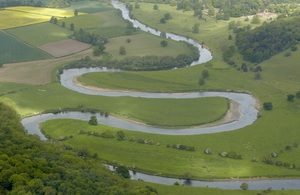Müller charity payment for ammonia discharge to the River Tern
Shropshire Wildlife Trust receives £100,000 for nature-based watercourse protection and water quality enhancement projects after company's permit breach.

The Shropshire Wildlife Trust will use the £100,000 windfall to improve water quality and protect the county's rivers, including the Severn. Photo: Shropshire Wildlife Trust
Shropshire Wildlife Trust has received a financial boost after the Environment Agency accepted an enforcement undertaking (EU) offer from Müller UK & Ireland Group LLP.
The payment is part of an EU offered by the company for its failure in effluent discharge to the River Tern at the Müller Dairy facility in Market Drayton, Shropshire, in January 2018.
Müller UK & Ireland Group LLP is the largest yoghurt producer in the UK. The EU occurred as a result of 3 charges of failing to comply with permit conditions, under regulation 38(2) Environmental Permitting (England and Wales) Regulations 2016, when an inlet screen was bypassed during maintenance works. Large pieces of fruit passed into the effluent treatment plant, leading to high levels of ammonia in the treated effluent discharged into the River Tern. The effluent contained in excess of the permitted level of ammoniacal nitrogen for a period of 15 days in January 2018.
Müller has since complied with the regulations and invested £2 million in improvements to environmental working practices and has made a contribution of £100,000 to Shropshire Wildlife Trust.
Shropshire Wildlife Trust works to restore lost habitats, helps declining species, and inspires future generations to care for nature in Shropshire. The donation will contribute towards the delivery of watercourse protection and water enhancement projects on the River Tern.
Sarah Dennis, a senior specialist for the Environment Agency, said:
Enforcement undertakings allow polluters to positively address and restore the harm caused to the environment and prevent repeat incidents.
The Environment Agency is increasingly using this method of enforcement for suitable cases to restore the environment, improve practices of the offending company, and avoid longer criminal court cases. However, we will prosecute in appropriate cases.
As well as donations totalling £100,000 to Shropshire Wildlife Trust that will bring great benefits to the environment, Müller UK & Ireland Group LLP has made significant improvements to its effluent-treatment plants and staff training.
Please report any environmental issues to the Environment Agency’s 24-hour incident hotline on 0800 80 70 60.
Pete Lambert, head of land and water at Shropshire Wildlife Trust, said:
Müller’s donation will support the land and water team who manage and improve the health of our county’s water by surveying aquatic species, running events and working with different partners to address flooding issues across the county.
The funds will support the delivery of vital watercourse-protection and water quality enhancement projects using nature-based solutions including fencing and tertiary water-treatment along a small tributary of the River Tern in north Shropshire.
The company has also paid the Environment Agency’s administration, investigation and legal costs.
Background
The regulations the companies did not meet:
In 2018: Regulation 38(2) – Failing to comply with a permit condition: Environmental Permitting (England and Wales) Regulations 2016.
What is an enforcement undertaking?
An enforcement undertaking is available to the Environment Agency as an alternative sanction to prosecution or monetary penalty for dealing with certain environmental offences. It is a legally-binding voluntary agreement proposed by a business or an individual when the EA has reasonable grounds to suspect that an environmental offence has occurred.
Enforcement undertakings for environmental offences were introduced under the Environmental Civil Sanctions (England) Order 2010 and the Environmental Civil Sanctions (Miscellaneous Amendments) (England) Regulations 2010.
Accepting an enforcement undertaking is always at the discretion of the Environment Agency, but if accepted, enables firms and individuals who have damaged the environment or operated outside of legislative requirements to offer to complete actions which will address the cause and effect of their offending, including making a payment to an appropriate environmental project.
EUs can be offered for offences including polluting rivers, breaching permit conditions designed to protect communities, or failing to register and comply with recycling/recovery obligations. The Environment Agency then carefully considers whether the actions offered by the offender are acceptable.
Why use enforcement undertakings?
- Businesses will voluntarily secure compliance now and in the future, without attracting a criminal record.
- The environment, local community and those directly impacted by the offending can benefit through actions being offered in an EU.
- They allow the EA to deal with the less intentional and polluting offending in a more proportionate way than prosecution through the criminal courts.
The Environment Agency reserves the right to prosecute where offenders fail to comply with the terms of an enforcement undertaking offer.
About Shropshire Wildlife Trust
Shropshire Wildlife Trust has a vision of a thriving natural world, where Shropshire’s wildlife and natural habitats play a valued role in addressing the climate and ecological emergencies, and people are inspired and empowered to take action for nature. It combine projects across Shropshire, including Telford & Wrekin, with advocacy and campaigning to restore nature and to engage people.
SWT manages more than 40 nature reserves and has almost 50 staff, 300 volunteers, and more than 9,000 members. SWT is an autonomous charity, but it is increasingly working collectively, as part of The Wildlife Trusts to ensure that local actions have a national impact and help to address global issues.